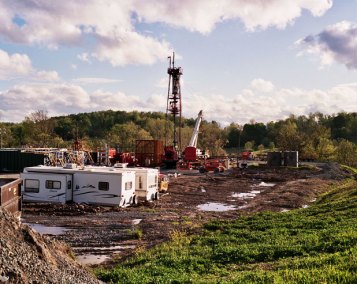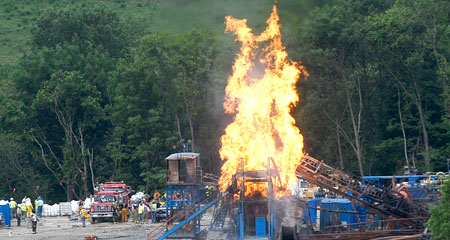We appreciate your attention to the extremely urgent matter of protecting our county’s air, water, infrastructure, health, and economic well being from likely impacts of widespread deep shale drilling and horizontal fracturing operations that may soon arrive in our beloved community.
We are concerned by your potential opposition to support of the BREATHE Act and regulation of wells in source water protection areas in the draft we presented and discussed with you on Jan. 24, 2012. We are concerned that these omissions will reduce the positive influence of this collaborative proposal. While we realize that you cannot make law or regulate these industrial facilities, your public statements could be a powerful influence on corporate practices and on state legislative and regulatory bodies, including Ohio Department of Natural Resources, which is developing new rules on these industrial processes.
We request your support for H.R. 1204 — Bringing Reductions to Energy’s Airborne Toxic Health Effects (BREATHE) Act, which would end special exemptions for oil/gas extraction from aggregation standards with which all other industries much comply. (Aggregation regulates groups of stationary sources of toxic air emissions located within a contiguous area and under common control with aggregate emissions equal to a single major source.) It would also end the exemption for Hydrogen Sulfide, “a very toxic gas that can lead to death and neurological impairment…In areas at or near rapidly growing oil and gas fields, this has led to a drastic change in air quality and growing public health concerns. In Garfield County, Colorado, for example, more than 30 tons of benzene are released into the air from 460 oil and gas wells. This is nearly 20 times more benzene than is released by a giant industrial oil refinery in Denver, yet the toxic emissions from these oil and gas wells are not subject to NESHAPs. The BREATHE Act will ensure reductions in VOC’s [volatile organic compounds] and ground level ozone, requiring easily implemented and inexpensive upgrades to currently available emissions reduction technologies.” (Rep. Jared Polis, a co-sponsor of the legislation)
Regarding opposition to regulation of private wells in source water protection areas: regulation is to protect the commons, including the air and drinking water that our community share and depend on. Toxic emissions and water contamination cannot be private matters in a civilized society. That is what government is for—to protect the common good that private interests cannot or will not. Drilling wells in a water source protection area will mean irremediable contamination of water supplies, as evidenced by many hundreds of cases of contamination around the country (ewg.org/reports/cracks-in-the-facade), including those documented by National Academy of Sciences (nicholas.duke.edu/cgc/pnas2011.pdf), USEPA (epa.gov/region8/superfund/wy/pavillion/EPA_ReportOnPavillion_Dec-8-2011.pdf), NY, PA, and Colorado authorities (nytimes.com/2011/02/27/us/27gas.html?pagewanted=all), as well as Ohio’s Division of Natural Resources (tddlaw.com/news.html). Anthony Ingraffea, Cornell expert on cement and well technology, has testified to the inevitability of well failure (www.parl.gc.ca/HousePublications/Publication.aspx?DocId=4918403&Language=E&Mode=1&Parl=40&Ses=3#Int-3708393). James Northrup attests to the inability of casings to protect water from the methane migration along the outside of well casings, because the bore hole itself acts as a conduit since space between casings and rock can not be sealed (scribd.com/doc/65577477/How-Gas-Wells-Leak). Ohio’s proposed standards “are less protective in important ways than those of other states experienced in deep shale gas drilling and lag behind the state of the art,” according to comments submitted by Natural Resources Defense Council on behalf of NRDC, Sierra Club, Ohio Environmental Council, Earthjustice, Buckeye Forest Council, Concerned Citizens of Portage County, Center for Health, Environment, and Justice, Green Environmental Coalition, Guernsey County Citizens Support on Drilling Issues, Progress Ohio, Athens Fracking Interest Group, Carroll Concerned Citizens, Inc., Concerned Citizens Ohio, Environment Ohio, Network for Oil & Gas Accountability & Protection, and other concerned citizens (ohioenvirolawcenter.files.wordpress.com/2011/12/nrdc-odnr-well-construction-comments-121211.pdf).
We urge you to consider these matters seriously and to do all you can to protect the economic well being, public health, and integrity of our county.
Sincerely,
Heather Cantino for committee members Al Blazevicius, Ann Brown, Bernhard Debatin, Ken Edwards, Roxanne Groff, Christine Hughes, Tom Lovdal, Sonia Marcus, Loraine McCosker, Michele Papai/Drabold, Nancy Pierce, Michael Rinaldi-Eichenberg, Bob Sheak, Angie and Matt Starline











Pingback: Athens Ohio Group Visits Marcellus Shale Area of Wetzel County
As always is the case when ever you take from nature there is a price to be paid and should the price be in our health and the health of nature from pollution to our environment from methods used by oil companies used in drilling for oil & gas. I realize that oil, gas and coal and timber are resources that we as a society need but we must use the safest methods that doesn’t harm our environment or the health of its creatures in harvesting these resources, if not then we should leave them alone until we can.
Pingback: Athens County Commissioners Likely to Vote Fracking Resolution | Slow Down Fracking in Athens County (SD-FRAC)